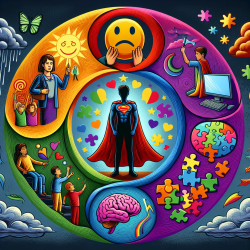Understanding the Victim-Bully Cycle in Sexual Minority Adolescents
Recent research published in Epidemiology and Psychiatric Sciences sheds light on a critical issue affecting sexual minority adolescents in China: the victim-bully cycle. This study, titled The victim-bully cycle of sexual minority school adolescents in China: prevalence and the association of mood problems and coping strategies, explores the complex dynamics of bullying among lesbian, gay, and bisexual (LGB) students and offers insights into effective interventions.
Key Findings
The study analyzed data from over 12,000 students and found that LGB adolescents face a heightened risk of both being bullied and bullying others compared to their heterosexual peers. Interestingly, the research identified a protective effect for sexual-undeveloped girls, who experienced fewer bullying-related problems.
Furthermore, the study revealed that negative coping strategies, hypomania, anxiety, and depression are linked to increased bullying and victimization. Conversely, positive coping strategies are associated with reduced bullying and victimization.
Implications for Practitioners
As a practitioner focused on creating positive outcomes for children, understanding these findings can significantly enhance your approach to therapy. Here are some actionable steps based on the research:
- Focus on Coping Strategies: Encourage the development of positive coping strategies in adolescents. This can mitigate the effects of bullying and reduce the likelihood of students becoming bullies themselves.
- Address Mood Disorders: Be vigilant in identifying signs of anxiety, depression, and hypomania in students, as these are linked to increased involvement in bullying.
- Create Supportive Environments: Work with schools to foster environments that are inclusive and supportive of sexual minority students. This can help reduce the incidence of bullying and its associated negative outcomes.
Encouraging Further Research
While this study provides valuable insights, there is a need for further research to explore the nuances of the victim-bully cycle in different cultural contexts. Practitioners are encouraged to contribute to this growing body of knowledge by conducting studies that examine the effectiveness of various interventions and coping strategies.
Conclusion
The findings from this study underscore the importance of targeted interventions for sexual minority adolescents. By implementing strategies that promote positive coping and address mood disorders, practitioners can play a pivotal role in breaking the victim-bully cycle and fostering healthier school environments.
To read the original research paper, please follow this link: The victim-bully cycle of sexual minority school adolescents in China: prevalence and the association of mood problems and coping strategies.










